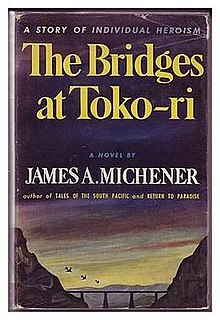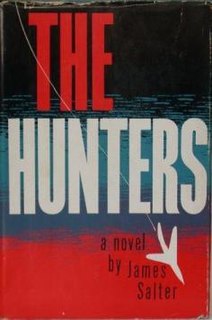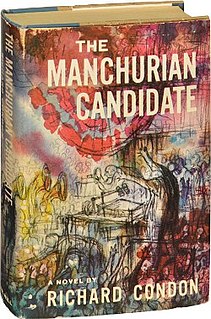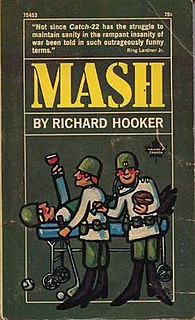 W
WThe Book of Lights is a 1981 novel by Chaim Potok about a young rabbi and student of Kabbalah whose service as a United States military chaplain in Korea and Japan after the Korean War challenges his thinking about the meaning of faith in a world of "light" from many sources.
 W
WThe Bridges at Toko-Ri (1953) is a novella by American author James A. Michener. The book details the experiences of United States Navy pilots in the Korean War as they undertake a mission to destroy heavily protected bridges in enemy territory.
 W
WThe Frozen Hours is a novel about the Korean War, which tells the dramatic story of the Americans and the Chinese who squared off in one of the deadliest campaigns in the annals of combat: the Battle of Chosin Reservoir, also known as Frozen Chosin.
 W
WThe Hunters is James Salter's debut novel and a tale of USAF fighter pilots during the Korean War, first published in 1956. The novel was the basis for the 1958 film adaptation of the novel starring Robert Mitchum and Robert Wagner with a different storyline.
 W
WIf You Leave Me (2018) is the debut novel of Crystal Hana Kim that was recognized as one of the best books of 2018 by The Washington Post, ALA Booklist, and others. This historical fiction novel takes place during the Korean War and focuses on the life of a refugee, Haemi Lee, and her family.
 W
WThe Manchurian Candidate is a novel by Richard Condon, first published in 1959. It is a political thriller about the son of a prominent U.S. political family who is brainwashed into being an unwitting assassin for a Communist conspiracy.
 W
WThe M*A*S*H book series includes the original novel that inspired the movie and then the TV series. The first, MASH: A Novel About Three Army Doctors, was co-authored by H. Richard Hornberger and W. C. Heinz ; it was published in 1968 under the pen name Richard Hooker. It told the story of a U.S. Mobile Army Surgical Hospital in Korea during the Korean War. In 1972, Hornberger published the sequel M*A*S*H Goes to Maine, covering the lives of the surgeons after they returned home from the war.
 W
WM*A*S*H Goes to Maine is a novel written by Richard Hooker and originally published in 1972. A sequel to 1968's book MASH: A Novel About Three Army Doctors, it features several of that novel's characters back in rural Maine after the Korean War armistice. An attempt to adapt M*A*S*H Goes to Maine as a feature film sequel to the 1970 movie was unsuccessful.
 W
WM*A*S*H Mania is a novel written by H. Richard Hornberger under the pseudonym Richard Hooker and originally published in 1977. After a series of M*A*S*H novels that were written by William E. Butterworth but credited to both Hooker and Butterworth, M*A*S*H Mania was his first book since M*A*S*H Goes to Maine (1972). The book, which follows the M*A*S*H characters in their continued post-war adventures in Maine, did not meet the same critical or commercial success as the original novel, MASH: A Novel About Three Army Doctors (1968).
 W
WMASH: A Novel About Three Army Doctors is a 1968 novel by Richard Hooker which is notable as the inspiration for the feature film M*A*S*H (1970) and the TV series of the same name (1972–1983). The novel is about a fictional U.S. Mobile Army Surgical Hospital in Korea during the Korean War.
 W
WThe Surrendered is a novel by Chang-Rae Lee about the lives of three characters during the Korean War. The novel also flashes back to the Japanese invasion of Manchuria and flashes forward to the 1980s in New York City and Italy. The book makes references to the Gallic Wars, Hector, and A Memory of Solferino, among other works. It was nominated as a finalist for the 2011 Pulitzer Prize for Fiction. It won the Dayton Literary Peace Prize for fiction in 2011.
 W
WThe Vicar of Christ is a bestselling 1979 novel by Walter F. Murphy. The novel tells the life story of the fictional Declan Walsh, who at various stages of his life is a Medal of Honor recipient for actions during the Korean War, Chief Justice of the United States, and finally Pope Francis I.
 W
WWar Trash is a novel by the Chinese author Ha Jin, who has long lived in the United States and who writes in English. It takes the form of a memoir written by the fictional character Yu Yuan, a man who eventually becomes a soldier in the Chinese People's Volunteer Army and who is sent to Korea to fight on the Communist side in the Korean War. The majority of the "memoir" is devoted to describing this experience, especially after Yu Yuan is captured by United Nations forces and imprisoned as a POW. The novel captured the PEN/Faulkner Award and was a finalist for the Pulitzer Prize.